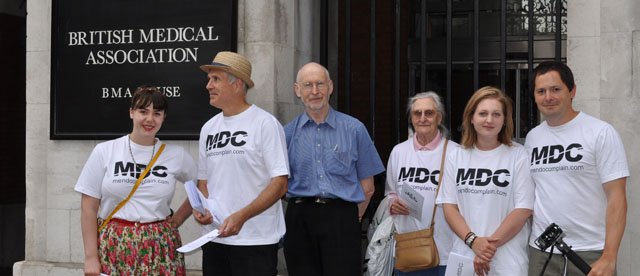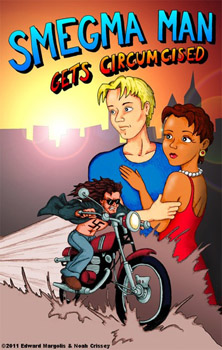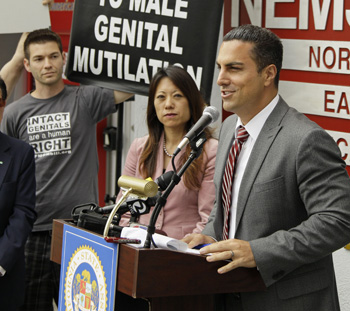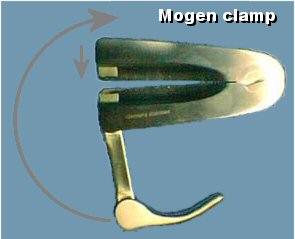|
Jewish Journal
August 2, 2011
Little-known non-cutting ritual appeals to some who oppose circumcision
By Jonah Lowenfeld
In the same week in which a San Francisco judge struck from the city’s November 2011 ballot a controversial measure aiming to ban circumcision of any male under 18, two reputable media sources reported on a relatively new, little-known ceremony that serves as a Jewish alternative to circumcision. The New York Times and NPR both reported on brit shalom — Hebrew for “covenant of peace” — and presented it as a small but growing phenomenon.
Brit shalom is frequently promoted by opponents of circumcision as a way to welcome baby boys into the Jewish covenant without the traditional ritual cutting that Jews have practiced for millennia and trace back to a biblical commandment from God to Abraham. But if you’ve never been to — or even heard of — this ceremony, you’re not alone.
“I have never had the pleasure of attending a brit shalom,” said filmmaker Eli Ungar-Sargon, whose 2007 documentary “Cut: Slicing Through the Myths of Circumcision” presents a critical look at the common surgical procedure.
Ungar-Sargon, who has called circumcision “physically harmful, medically irresponsible and morally wrong,” said that an alternative to Jewish ritual circumcision, or brit milah, was “a great idea” — albeit one whose time has clearly not yet come.
“Calling it a marginal phenomenon would be generous,” he said.
A survey of Jewish ritual circumcisers and brit shalom “celebrants” working in and around Los Angeles confirms Ungar-Sargon’s impression.
Interviews with 12 of the 22 Jewish ritual circumcisers currently practicing in the greater Los Angeles area found they had collectively performed approximately 1,400 traditional Jewish circumcisions in 2010.
By contrast, there are just five known brit shalom celebrants in Southern California. Of the four who could be reached for this article, two had never performed the ceremony.
The third, Rosalie Gottfried, a secular humanist madricha (Hebrew for leader), estimated she had done six in the past decade, and always for parents opposed to circumcision.
“The only time I’m called upon is when a couple chooses to use ‘naming and welcoming’ instead of cutting,” Gottfried, who lives in Laguna Woods, wrote in an e-mail.
The fourth, Hershl Hartman, is the secular Jewish vegvayzer (Yiddish for leader) of the Sholem Community in Los Angeles. He has been naming — without circumcising — Jewish baby boys since the mid-1980s, “several dozen” in all, at a rate of about five every year.
That annual number, however, includes both girls and boys — which is appropriate because secular Jewish leaders like Hartman, who were among the earliest proponents of non-cutting naming ceremonies for Jewish baby boys, were motivated not by opposition to circumcision but by a commitment to egalitarianism.
According to Gottfried, the earliest known brit shalom ceremony was performed around 1970 by her mentor, Rabbi Sherwin Wine, the founder of the Society for Humanistic Judaism.
In 2002, the Leadership Conference of Secular and Humanistic Jews issued a statement about circumcision and Jewish identity that focused much of its attention on gender parity in religious practice.
“Our profound belief in the equality of men and women requires/ensures that Jewish welcoming ceremonies are not different for infant males than for infant females,” reads an excerpt from the statement’s preamble.
“We actually take a really open and welcoming perspective that you don’t have to be circumcised in order to be Jewish,” said Rabbi Adam Chalom, the dean of the North American branch of the International Institute for Secular Humanistic Judaism.
But don’t lump secular Jewish leaders along with anti-circumcision activists.
In June, Chalom contributed to a Chicago Tribune religion blog an entry titled “Circumcision Is Up to Parents,” in which he said that although “circumcision is non-consensual, irreversible, and painful,” there were valid medical, historical and cultural reasons for parents to choose circumcision for their sons.
“If anyone asks me, I say do it in an antiseptic setting,” Chalom said.
Chalom — the “ch” is pronounced in the French manner, as in chateau — leads the Kol Hadash Humanistic Congregation in Chicago. He said he gets “one or two” inquiries every year about brit shalom and has done “four or five” ceremonies in the last 10 years.
The most complete list of celebrants of brit shalom includes five prominent Jewish leaders in the anti-circumcision movement among the 50 people who perform the ceremony worldwide. Many of the others named on that list, which is hosted on a prominent anti-circumcision Web site, [Woo hoo! Actually, a pro-intact website] are secular Jewish leaders.
Mark Reiss, the 78-year-old retired Jewish doctor who is executive vice president of Doctors Opposing Circumcision, maintains the list — although he hadn’t performed a brit shalom until earlier this year. But since he had his “aha” moment and turned firmly against circumcision in 1999, Reiss has worked to gather the names of rabbis and other Jewish leaders willing to perform brit shalom ceremonies.
Moshe Rothenberg, a New York City social worker and literacy teacher, is believed to have performed more of the non-cutting ceremonies than anyone else in the world.
A Reconstructionist Jew and an active member of the movement against circumcision, Rothenberg estimated that in the nearly 25 years since his son was born (but not circumcised), he has performed the ceremony between 150 and 200 times.
Ironically, some Jewish parents with concerns about brit milah have made inquiries with the person least likely to provide them with an alternative to traditional circumcision: a mohel, or Jewish ritual circumciser.
“They want the ceremony minus the circumcision,” said Fred Kogen, a Los Angeles-based physician who has gotten a few such requests in his 26 years of practicing as a mohel. “I say, ‘Look, I can’t do it for you.’ ”
Unlike brit milah, which has liturgical elements that remain largely consistent between one ceremony and another, the Jewish boys’ naming ceremonies that do not feature circumcision are often tailored by parents and leaders, and therefore vary widely.
Chalom, who sometimes calls the ceremony a brit ahava (covenant of love) or brit mishpachah (covenant of family), said he occasionally uses lines from the traditional brit milah ceremony.
Judith Seid, a secular humanistic rabbi and cantor who leads Tri-Valley Cultural Jews in Pleasanton, also doesn’t typically use the term brit shalom.
“We usually just call it a baby naming,” she said. “Same like with a girl.”
Seid presided over the naming of a baby boy in San Francisco on July 30. The script for the event included remarks about Jewish tradition, the child’s parents and grandparents, and the Jewish community. No mention was made of the circumcision that did not take place.
At other brit shalom ceremonies, however, officiants do talk about what’s not going on. [or rather, what's not coming off...]
In a booklet circulated at a Los Angeles naming ceremony in June, brit milah is referred to as “the pre-historic custom of the hunting/gathering/herding Hebrew tribes.”
“This is a ceremony of brit shalom, the peaceful covenant,” the text continued.
Hartman of the Sholem Community presided over that ceremony. In accordance with the secular Jewish leadership’s 2002 statement, Hartman doesn’t take a position on whether parents should circumcise — although he said he will not preside over circumcision ceremonies, which are inherently “theistic.”
Hartman does criticize religious leaders who exclude uncircumcised Jews from practices at their houses of worship — particularly rabbis who will not allow an uncircumcised boy to become a bar mitzvah in their synagogues.
“That tragic situation underlined to me the need for the religious Jewish community to examine more intensely the prehistoric origins of the rite,” Hartman said.
All the major branches of religious Judaism require — or at least encourage — circumcision. But if, as recent stories in The New York Times and NPR have reported, the incidence of brit shalom is increasing, it could follow the path of another practice that many Jews once considered (and some still do) controversial: intermarriage.
“When I first started doing interfaith marriages, you can bet that I got a lot of flak from my colleagues in the Reform movement,” said Rabbi Yeshaia Charles Familant, who was one of the first Reform rabbis in the country to begin performing intermarriages, in 1967.
When the couples he helped marry later had children, they called him, which is why Familant started performing what he called brit chayim — covenant of life — ceremonies in the early 1970s. Before retiring this year, the Menlo Park-based rabbi said he probably performed about 15 or 20 non-cutting naming ceremonies annually.
Familant is not opposed to circumcision, but he has no problem performing brit shalom-type ceremonies.
“If it violated any of my principles I would not have done any of this,” he said.
But other liberal rabbis who perform brit shalom ceremonies are not sold on the new ritual.
“Let’s just say that I do the ceremony,” said Jerry Levy, a 69-year-old Reform rabbi based in Tiburon. “I may not favor it, but I do it.”
Levy said he believes that parents should be able to choose the content of their religious practice. But it was no coincidence, Levy said, that brit shalom appeals mostly to parents who have a weaker sense of Jewish identity and less interest in Jewish continuity.
“I think that this not wanting to circumcise your sons is part of this process of diluting Judaism and assimilating into a very bland culture,” Levy said.
[Conversely, the appearance of a strict requirement for genital cutting may be driving some people away from Judaism altogether.
And while this article emphasises how few parents choose Brit Shalom, by making it better known, it will inevitably increase the demand.]
| 



